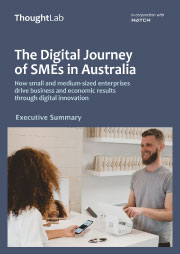Helping SMEs understand their digital journey
Meta commissioned ThoughtLab, a global research firm, and Hatch, a global professional services firm, to conduct a comprehensive study of how SMEs drive business and economic performance through digital transformation. The study included a survey of 1,250 SME owners and managers across regions and industries in Australia.
SMEs play a pivotal role in the government’s plans for Australia to develop a leading digital economy by 2030. Because of the need for social distancing during the COVID pandemic, SMEs have already accelerated their use of digital technologies, from email, websites, and messaging apps to collaboration tools, the cloud, and e-commerce solutions. SMEs use these tools forexternal and internal purposes: to connect and communicate with customers, employees, and suppliers; create new products and services; access new, cost-effective ways to market and sell their products; and drive operational efficiencies.

This report will answer the following questions:
- How is the adoption of digital technologies affecting the financial and business performance of SMEs?
- Which digital technologies and approaches deliver the best results for SMEs?
- How will these results benefit the Australian economy?
Who should read this paper?
The insights in this paper will be useful to anyone interested in the digital development of Australian communities and businesses, and especially to:
- Small and medium-sized businesses in Australia
- Small and medium-sized businesses across the world
- Government agencies within and outside Australia

Hatch and ThoughtLab developed a digital maturity model to assess how stages of digital transformation influence business performance consisting of six performance pillars.
The pillars are:
- Digital technology usage – How are companies using a range of digital technologies, such as AI, cloud, and other solutions?
- Operations – How mature does your firm need to be in using digital technologies to drive performance across various parts of its business?
- Talent and skills – How far do you have to develop your organisational structure, talent, and skills to drive digital transformation?
- Customer engagement – How advanced are Australian firms at using digital technologies for customer communication, marketing, and analysis?
- E-commerce – How can you sell products and services through digital channels, online stories, and other digital platforms?
- Leadership - How mature does your business need to be to establish a strategy and culture that promotes digital transformation?
Download the report today!
Key Insights:
- Successful digital transformation does not come from simply using digital technology. It requires rethinking business approaches, building digital talent and skills, interacting online with customers, growing sales through digital channels, and creating a culture of ongoing innovation.
- Small and medium-sized businesses not only drive their own performance through digital technology, but also boost the growth of the local economy. While the benefits of digital transformation are clear, SMEs face speed bumps on the road to digital leadership.
- SMEs often lack the skills, infrastructure, and budgets needed to succeed. They also may struggle to keep up with rapid technological change, while also coping with escalating data privacy and security risks.

Daniel Miles
Director, Urban Solutions, Urban Solutions
Dr. Miles is an applied microeconomist who leads complex economic analysis projects across a variety of sectors and industries. Daniel is skilled at using economics and statistical analysis to produce evidence-based thought leadership. He specializes in analyzing the impact of technological, economic, and demographic shifts on industries, cities, and individual companies. He has led many ground breaking thought leadership studies smart cities, cybersecurity, artificial intelligence, autonomous vehicles, the future of work, cashless cities, and digital transformation.

